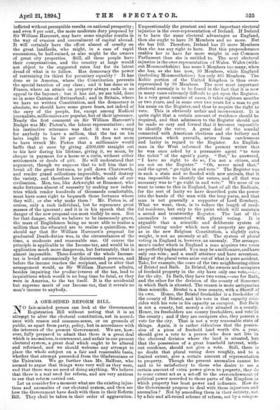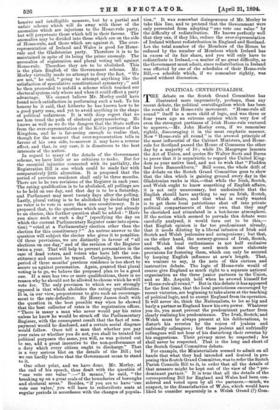A ONE-SIDED REFORM BILL.
NO• fair-minded person can look at the Government Registration Bill without noting that it is an attempt to alter the electoral constitution, not in accord- ance with reason and common-sense, or on grounds of public, as apart from party, policy, but in accordance with the interests of the present Government. We are, how- ever, fully prepared to admit that there is a great deal which is anomalous, inconvenient, and unfair in our present electoral system, a great deal which ought to be altered and reformed, and we should welcome any attempt to place the whole subject on a fair and reasonable basis, whether that attempt proceeded from the Gladstonians or the Unionists. We go further than Mr. Balfour, who seemed to argue that things were very well as they were, and that there was no need of doing anything. We believe that there is a real need for reform, and are very anxious to see that reform carried out.
Let us consider for a moment what are the existing injus- tices and anomalies of our electoral system, and then see bow the Government have dealt with them in their Reform Bill. They shall be taken in their order of aggravation. Unquestionably the greatest and most important electoral injustice is the over-representation of Ireland. If Ireland is to have the same electoral advantages as England, then she ought to have 78 Members and no more. But she has 103. Therefore, Ireland has 25 more Members than she has any right to have. But this preponderance enables her to have far more weight in our Common Parliament than she is entitled to. The next electoral injustice is the over-representation cf Wales. Wales (with- out Monmouthshire) has some 5 Members too many, when she has, as she has now, 30 Members, while England (including Monmouthshire) has only 465 Members. The Keltic portion of the 'United Kingdom is thus over- represented by 30 Members. The next most important electoral anomaly is to be found in the fact that it is now in many cases extremely difficult to get upon the Register. In a very great number of cases, it takes eighteen months or two years, and in some over two years for a man to get his name on the Register, and thus to acquire the right to vote. This is obviously unfair and inconvenient. It is quite right that a certain amount of residence should be required, and that admission to the Register should not be made so easy and formal that it becomes impossible to identify the voter. A great deal of the scandal connected with American elections and the bribery and personation which prevails, arises from carelessness and laxity in regard to the Register. An English- man in the West informed the present writer that he was once asked by a persuasive agent "to vote the ticket" of the agent's party. "But," he answered, "I have no right to do so, I'm not a citizen, and am not on the Register." "Oh, never mind that," said the agent, "go right in and vote." The Register was in such a state and so flooded with new arrivals, that it was impossible to identify the voters, and all that was necessary was to "go right in and vote." We none of us want to come to this in England, least of all the Radicals, for the sort of laxity we have described puts the power into the hands of the man with the long purse, and that man is not generally a supporter of Lord Rosebery. What we want, then, is to reduce the length of need- ful residence, but only to the point which will maintain a sound and trustworthy Register. The last of ' the anomalies is connected with plural voting. It• is arguable that a scientific and deliberate system of plural voting under which men of property are given, as in the new Belgium Constitution, a slightly extra weight, is not an anomaly at all. The system of plural voting in England is, however, an anomaly. The arrange- ments under which in England a man acquires two votes are perfectly haphazard. You may be amillionaire, and have only one vote ; and a. small attoirney and have seventeen. Many of the plural votes arise out of what is pure accident. Take, for example, the cases of the two neighbouring cities of Bristol and Bath. In Bristol, the owners and occupiers of freehold property in the city have only one vote,—i.e, for the city. In Bath, they have two votes,—one for Bath, and the other for the division of the county of Somerset in which Bath is situated. The reason is more antiquarian than scientific. Bristol is a true county, with a Sheriff of its own. Hence, the Bristol freeholder is a freeholder of the county of Bristol, and his vote in that capacity coin- cides with his vote in his capacity as occupier. But Bath is not a county, but merely a city situated in a county: Hence, its freeholders are county freeholders, and vote in the county ; and if they are occupiers also, they possess a. vote for the city. That is not a very reasonable state of things. Again, it is rather ridiculous that the poskies- sion of a piece of freehold land worth 40s. a. year, should give a vote to a person who does not live in the electoral division where the land is situated, but that the possession of a great leasehold interest, with- out residence, should not give a vote. Still, there is no doubt that plural voting does roughly, and to a limited extent, give a certain amount of representation to property. Though the present anomalies cannot be said to be satisfactory to those who desire to see a certain amount of extra power given to property, they do to some extent act as a set-off to the over-endowment otf. political power accorded to those parts of the Kingdom in which property has least power and influence. How do the Government propose to deal with these injustices and anomalies ? Not by amending them in their entirety, not by a fair and all-round scheme of reform, not by a comp:e- hensive and intelligible measure, but by a partial and unfair scheme which will do away with those of the anomalies which are injurious to the Home-rule party, but will perpetuate those which tell in their favour. The anomalies may be divided into those which are on the side of Home-rule, and those which are against it. The over- representation of Ireland and Wales is good for Home- rule and the GIadstonian party. Therefore it is to be maintained in spite of its being the prime anomaly. The anomalies of registration and plural voting tell against Home-rule. Therefore they are to be abolished. This is the plain English of the Government scheme. Mr. Morley virtually made no attempt to deny the fact. "We are not," he said, "going to attempt anything like the satisfaction of speculative constitutional symmetry ; " and he then proceeded to unfold a scheme which touched our electoral system only where and when it could effect a party advantage. We cannot believe Mr. Morley could have found much satisfaction in performing such a task. To his honour be it said, that hitherto he has known how to be a good party man, and yet to avoid anything in the shape of political unfairness. It is with deep regret that we see him tread the path of electoral gerrymandering. He knows as well as we do the dangers that the State suffers from the over-representation of the Keltie portions of the Kingdom, and he is far-seeing enough to realise that, though for the moment that over-representation tells in favour of his own side, to-morrow it may have a reverse effect, and that, in any case, it is disastrous to the best interests of the nation.
In regard to many of the details of the Government scheme, we have little or no criticism to make. But for the essential injustice connected with its partiality, the Registration Bill is one which could be made fair with comparatively little alteration. It is proposed that the period of previous residence shall only be three months. There are to be two revisions of the Register in each year. The rating qualification is to be abolished, all pollings are to be held on one day, and that day is to be a Saturday, and Parliament may meet twenty days after the polling. Lastly, plural voting is to be abolished by declaring that no voter is to vote in more than one constituency. It is proposed that, to the questions which may be put already to an elector, this further question shall be added : "Have you since such or such a day" (specifying the day on which the current Parliamentary Register came into opera- tion) "voted at a Parliamentary election other than the election for this constituency ?" An untrue answer to the question will subject the elector who gives it to penalties. Of these provisions, we are distinctly in favour of "all elections on one day," and of the revision of the Register twice a year. That will help to prevent personation in the case of dead voters, and voters who have left the con- stituency and cannot be traced. Certainly, however, the period of three months' previous residence is too short to secure us against personation. Again, granted that plural voting is to go, we believe the proposed plan to be a good one. If a man has two or more qualifications, there is no reason why he should not be alloived to choose which he will vote for. The only provision to which we are strongly opposed is that which abolishes the rating qualification. It is, in our view, preposterous to give such an encourage- ment to the rate-defaulter. Sir Henry James dealt with the question in the best possible way when he showed that the best collector of rates is the registration officer. "There is many a man who never would pay his rates unless he knew he would be struck off the Parliamentary Register' with the consequent result that the fact of non- payment would be disclosed, and a certain social disgrace would follow. Once tell a man that whether you pay your rates or whether you do not, you shall be treated for political purposes the same, you will, as was pointed out to me, add a great incentive to the non-performance of a duty which every citizen ought to discharge." That is a very serious blot on the details of the Bill ; but we can hardly believe that the Government mean to stand to it.
One other point, and we have done. Mr. Morley, at the end. of his speech, thus dealt with the question of "one vote one value" :—" It means," he said, "the breaking up on a great scale of the boundaries of boroughs and electoral areas." Besides, "if you are to have 'one vote one value,' you will have to redistribute seats at regular periods in accordance with the changes of popula- tion." It was somewhat disingenuous of Mr. Morley to take this line, and to pretend that the Government were only prevented from adopting "one vote one value" by the difficulty of redistribution. He knows perfectly well that they can, if they like, reduce the over-representation of Ireland without redistribution in England and Scotland. Let the total number of the Members of the House be reduced by the number of Members which Ireland has in excess of its fair share, and you will only have to redistribute in Ireland,—a matter of no great difficulty, as the Government must admit, since redistribution in Ireland was effected by one of the schedules of their Home-rule Bill,—a schedule which, if we remember rightly, was passed without discussion.



































 Previous page
Previous page